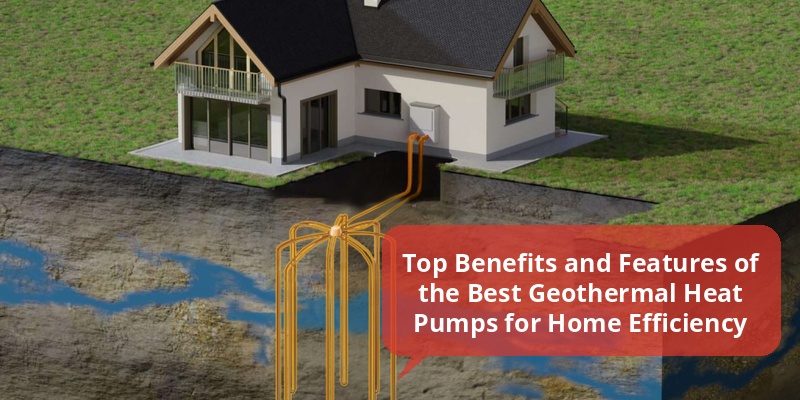Geothermal heat pumps are revolutionizing the way American homeowners heat and cool their homes by offering a highly efficient, sustainable alternative to conventional HVAC systems. These systems leverage stable underground temperatures to provide consistent climate control while significantly reducing energy costs. The best geothermal heat pumps on the market deliver superior reliability and environmental benefits, making them an attractive choice for energy-conscious consumers.
| Feature | Benefit | Consideration |
|---|---|---|
| Energy Efficiency | Can reduce energy use up to 70% compared to traditional systems | Initial installation cost is higher but offset by long-term savings |
| Environmental Impact | Uses renewable underground heat, lowering carbon footprint | Requires proper site evaluation to ensure ground suitability |
| Durability | Indoor components last 20+ years; underground loops last 50+ years | Proper installation is critical for system longevity |
| Maintenance | Low maintenance with fewer moving parts compared to traditional HVAC | Periodic system checks are necessary to maintain performance |
What Is a Geothermal Heat Pump and How Does It Work?
A geothermal heat pump (GHP) is an advanced heating and cooling system that uses the earth’s stable underground temperature to regulate building temperatures. Unlike traditional HVAC systems that rely on outside air, a GHP exchanges heat with the ground through a series of buried pipes known as a ground loop.
In the winter, the system extracts heat from the ground to warm the home, and in the summer, it transfers heat from the home back into the ground, creating an efficient thermal exchange process. This mechanism requires less electricity than conventional heating or cooling systems, significantly reducing energy consumption.
Key Benefits of Using the Best Geothermal Heat Pumps
Exceptional Energy Efficiency and Cost Savings
Geothermal heat pumps use 25% to 50% less electricity than traditional HVAC systems, leading to dramatic reductions in monthly energy bills. Over time, savings can offset the higher initial installation cost. Federal and state incentives also help reduce upfront expenses for property owners.
Environmentally Friendly Heating and Cooling Solution
Because geothermal systems use renewable energy from the earth and avoid combustion of fossil fuels, they dramatically lower greenhouse gas emissions. Their clean and efficient operation helps homeowners contribute positively to environmental preservation efforts.
Durability and Longevity
The ground loop components commonly have a service life exceeding 50 years, while the inside heat pump unit typically lasts 20–25 years. This far exceeds the lifespan of standard HVAC equipment, providing long-term reliability.
Quiet and Low Maintenance Operation
Geothermal heat pumps operate quietly as most components are underground or inside the home. Their design features fewer mechanical parts that wear out quickly, reducing maintenance frequency and cost.
Types of Geothermal Heat Pumps to Consider
| Type | Description | Best For |
|---|---|---|
| Closed-Loop System | Circulates a mixture of water and antifreeze in pipes buried horizontally or vertically | Homes with sufficient land space and stable soil conditions |
| Open-Loop System | Draws groundwater directly from a well, pumps it through the system, then returns it | Locations with abundant groundwater sources |
| Pond/Lake Loop System | Uses a body of water as the heat exchange medium via submerged loops | Properties located near ponds or lakes with adequate volume |
Factors to Evaluate When Choosing the Best Geothermal Heat Pump
Climate and Soil Characteristics
Understanding local soil conductivity, moisture content, and temperature stability is vital to optimize system efficiency. Some soils and terrains provide better heat transfer characteristics, impacting loop design and installation costs.
System Capacity and Home Size
The heat pump must be sized correctly based on the square footage, insulation quality, and heating/cooling load of the home to ensure optimal performance and energy efficiency.
Installation Requirements and Costs
Installation expense varies depending on loop type, ground conditions, and local labor rates. While initial costs are higher than traditional systems, financial incentives and energy savings make geothermal heat pumps a cost-effective choice over time.
Popular Brands Known for the Best Geothermal Heat Pumps
- WaterFurnace: Renowned for innovative technology and high-performance units designed specifically for residential use.
- Climatemaster: Offers a wide range of reliable, efficient geothermal models suited for different home sizes and climates.
- Bosch Thermotechnology: Produces energy-efficient geothermal heat pumps integrating advanced control systems.
- GeoStar: Provides customizable geothermal solutions known for durability and exceptional warranty programs.
Federal and State Incentives Making Geothermal Heat Pumps Affordable
The U.S. government provides significant tax credits that refund up to 26% of the installation costs for homeowners investing in geothermal heat pumps. Many states and utilities offer additional rebates and financing programs to further reduce upfront expenses.
These financial incentives enhance the affordability and attractiveness of geothermal heating and cooling for more American families.
Maintaining and Optimizing Geothermal Heat Pump Performance
Regular System Inspections
Routine checks of the indoor components and underground loops ensure the system operates efficiently. Inspecting for leaks, checking refrigerant levels, and cleaning air filters are important maintenance tasks.
Professional Servicing
Annual servicing by certified HVAC professionals helps extend the equipment lifespan and maintain optimal efficiency. Early detection of issues prevents costly repairs.
Proper Thermostat Settings and Usage
Using programmable thermostats and efficient temperature settings can further enhance energy savings without compromising comfort.
